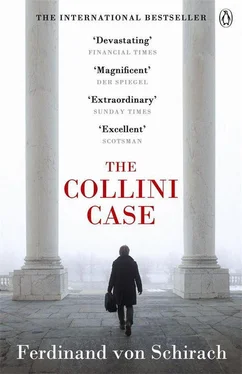When Leinen hung up, it was as if he could smell the gun oil. He closed his eyes. Then, suddenly, he jumped up, switched the light on and hurried over to the wall with the crime-scene photos. Page 26, Number 52: ‘Weapon: Walther P38’, a police officer had written under the photograph. Leinen examined the pistol closely; he picked up a magnifying glass from his desk. He knew that gun. Then he called his father’s number again.
Next morning, Leinen went by rail from Berlin to Ludwigsburg. He had found a trail – it was vague and faint, but it was something to follow up. At Ludwigsburg station he asked a taxi driver about the address. The cabby said it wasn’t far, he could easily walk it, but of course he’d be happy to drive him there. Inside, the car smelled of thyme and patchouli, a chain with the Eye of Fatima on it hung from the rear-view mirror. The long buildings of the old garrison town were painted yellow and pink, everything here looked neat and tidy. The driver asked Leinen where he had come from, and said that his daughter was studying in Berlin. That was a fine city too, he added, like Ludwigsburg, only bigger. They passed the town hall and the castle, and stopped outside a rather dilapidated building. Leinen got out and crossed the small square. On his left was the gatehouse, an old entrance to the city. Later, gravediggers had lived there, and for a few years it had been an educational institution for delinquent children. The narrow wall of the tall building faced the street; it used to be known to the locals as ‘the blockhouse’. It had been a prison for many years, and the prison walls still stood. The government department that Leinen had come to visit had moved there only the year before, in 2000.
Leinen had to shout his name into the intercom a couple of times; it had a loose contact. An automatic buzzer opened the rusty gate in the wall. Leinen crossed the interior courtyard to an iron door. It was unlocked. Inside the place looked as government departments always do: PVC floor covering, neon lighting, woodchip wallpaper, aluminium door handles. There were empty drinks crates outside the lodge at the entrance; the officers in their blue uniforms were friendly and sounded bored. It was all well-worn, slightly shabby, but no one was concerned about that, no one was going to renovate the place. A courteous, lanky man greeted Leinen, took him to the reading room on the first floor and explained the procedure there. Leinen had telephoned in advance. He had hardly anything to go on, just a name and a country. He had thought there was no chance of finding anything out, but the government employees had come up with what he was looking for among the million and a half index cards. Documents lay on the pale wood table, fourteen blue-grey folders, neatly labelled and stacked in a pile. An old woman sitting one chair away from him could hardly see what she was reading; she held a sheet of paper right up to her eyes and moved it from right to left to decipher it. She kept shaking her head, and sometimes she sighed.
After the courteous man had gone away, Leinen, still standing, picked up the first folder. He hesitated to open it. He could see the bus stop from the window. A schoolboy was fooling around there with his girlfriend; they were laughing, messing about, then kissing again. At last Leinen took off his jacket and hung it over the back of his chair. He sat down and took a sheaf of thin, yellowed papers out of the folder.
That evening he took a room in a cheap boarding house near the station. At night he listened to the endless goods trains passing, while the traffic lights outside his window bathed the room by turns in red, amber and green. He stayed in Ludwigsburg for five days. Every morning at eight he walked the short distance back to the reading room. He bought himself a travel guide, and realized that the history of the city was the history of the wars it had known. In 1812, the Württemberg army came here, almost sixteen thousand men, fighting for Napoleon; nearly all of them died in Russia. In the First World War a hundred and twenty-eight officers and four thousand one hundred and sixty men of the Old Württemberg Regiment died ‘on the field of honour’, as the wording carved in stone on a war memorial said. In 1940 the film Jew Süss was made in this city, because the real-life Joseph Süss Oppenheimer had lived in Ludwigsburg.
Leinen sat in the reading room, the stack of folders at his place rising higher every day, his notes filling page after page, notepad after notepad. He asked for so many photocopies that the reading-room staff began to groan. Leinen always worked through until evening, he didn’t stop for a break; his eyes were red-rimmed. At first the files seemed strange to him; he hardly understood what he was reading. But gradually all that changed. There in the large, bare room the paper came to life, it all reached out to him, and by night he dreamed of the files. When he drove back to Berlin he had lost all of two kilos in weight. He carried boxes full of photocopies into his chambers, went to his apartment, drew the curtains and lay in bed all weekend. On Monday he visited Collini in remand prison. And when, seven hours later, Leinen left the prison again, he knew what he must do.
On the day before the trial was to continue, Mattinger gave a party to celebrate his sixty-fifth birthday. Leinen arrived late for it; he had been working in his chambers up to the last minute, preparing for the next day in court. He had to park his old car some way off. He passed a long line of expensive vehicles before he reached the gate to Mattinger’s property, showed a security man his invitation and went into the courtyard.
Mattinger had invited over eight hundred guests. A large marquee had been put up on the lawn going down to the lake outside the house, a band was playing jazz, there were countless candles in coloured-glass lanterns on the two terraces, in the grass and on the landing stage. Mattinger had hired a large boat that put in there from time to time to take guests out on the lake.
Leinen recognized several actors, a woman TV presenter, footballers, a well-known hairdresser and the chairman of the board of a bank who had been released from remand prison two days before. He helped himself to something from the buffet; he’d eaten almost nothing for two days. The band played well, he had a CD of the girl singer. He listened for a while. When the musicians stopped for a break, he went in search of Mattinger, couldn’t find him, and went out on the landing stage. Large wickerwork seats with white cushions stood on the platform where the boats were tied up, the faint light of the candle lanterns showing their outlines. He was alone. There was mist above the Wannsee. It was cool for this time of year. A few boats drifted slowly on the water. Mattinger’s house, on the slope above, was brightly lit and reflected in the lake. Leinen turned up the collar of his dinner jacket. He took his father’s silver case out of his pocket and lit a cigarette. The water lapped against the wooden posts of the landing stage.
‘Good evening, Herr Leinen. Mattinger said that if you were here, this was where I’d probably find you. He obviously knows you very well.’
Leinen turned his head as he sat there. It was Baumann, the company lawyer from the Meyer Works. He was holding a glass, and he wore a dress shirt with a wing collar. Even in the dark, his face still looked red. Leinen stood up to shake hands. Baumann sat down on another wicker seat beside him.
‘Nice house Mattinger has,’ said Baumann. ‘I can’t wait to see the firework display on the lake.’
‘There’s probably too much mist for a good view of it,’ said Leinen.
‘Yes, maybe. How’s the trial going?’
‘So-so,’ said Leinen. He didn’t want to talk about it. He looked out at the black lake again.
Читать дальше












